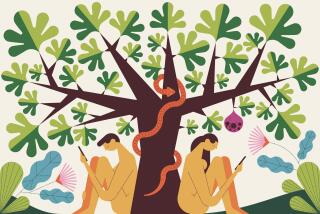College peers lose respect for those who ‘hook up’ too often
- Share via
The American Sociological Assn.’s annual meeting got underway Friday in Denver, and among the weighty topics to be discussed is the practice of “hooking up.”
For any readers who are not familiar, hooking up refers to “casual sexual activity,” according to one of the more tame definitions offered by Urban Dictionary. A study to be presented on Monday focuses on the social consequences for those who engage in frequent hookups.
Two researchers from the University of Illinois at Chicago examined responses from more than 19,000 students who completed the Online College Social Life Survey last year. They found that both men and women on college campuses lose respect for those who hook up too often — and in a sign of moving toward gender equality, students of both sexes were likely to be scorned for their promiscuous behavior.
The study also shows that colleges dominated by Greek culture and the glorification of male varsity sports may hold on more to the traditional sexual double standard.
Study co-author Rachel Allison, a doctoral candidate at the University of Illinois, Chicago, discussed the findings with The Times.
Why did you decide to study this topic?
I was interested in looking at the continued success of the gender revolution when it comes to sexuality — whether or not sexual double standards still existed when it comes to casual sex. In the last 40 years, studies have changed focus toward casual sex, and this is very avant-garde.
There were advantages with the dataset, which involves students nationwide. We had a good cross-section of students and explicit survey questions to assess.
What was the most surprising result?
One really surprising pattern was that 75% of students had egalitarian attitudes, meaning they held men and women to the same standard when it came to causal sex. But even though attitudes were more equal than not, they were relatively conservative. That means the participants lost respect for both men and women equally.
Were there any patterns that helped predict people’s views on hooking up?
A very small number of college kids hold a traditional double standard where women are different than men. Those who do are overwhelmingly male and most likely varsity athletes.
We think this has something to do with particular campuses in which these organizations dominate the social scene. Those particular campuses that are organized around the glorification of varsity athletics — that is the space where the double-standard will make its last stand.
Women in sororities were more likely to hold reverse double standards, judging men more than women for “hooking up.” Why is that?
We think this points to the fact that the Greek culture on some campuses is characterized by adversarial gender relationships. Women in sororities are more likely to be socially connected to each other as opposed to Greek men.
The sexual revolution has normalized premarital sex between people in a relationship. Is equality in the attitudes toward casual sex a further step toward sexual liberation?
The sexual revolution has been pushed forward, but there is a caveat that speaks to the type of equality we are looking for. Most students are egalitarian and also relatively conservative. Is this the equality we want? The gender revolution certainly has advanced, but it doesn’t mean it’s moved further toward sexual revolution.
What is the most significant take-away of this study?
Despite the fact that hooking up is a common experience, people aren’t hooking up as much as you think. Many students don’t approve, and they have negative and ambivalent attitudes toward the peers who hook up often.
Return to the Booster Shots blog.






